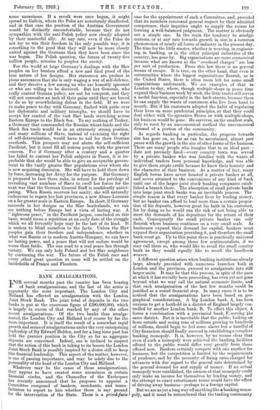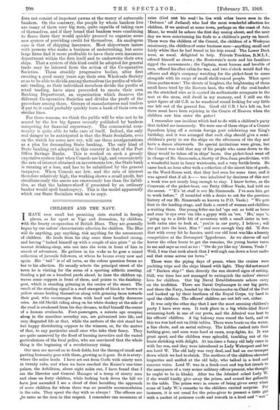BANK AMALGAMATIONS.
FOR several months past the country has been hearing of bank amalgamations, and the last of the series is apparently the most important. The London City and Midland has effected an amalgamation with the London Joint Stock Bank. The joint total of deposits in the two banks is put at the enormous figure of £280,000,000, which is largely in excess of that reached by any of the other recent amalgamations. Of the two banks thus amalga- mated, the London City and Midland is of course by far the more important. It is itself the result of a somewhat rapid growth and series of amalgamations under the very enterprising leadership of Sir Edward Holden, and for a long time past has held the premier position in the City so far as aggregate deposits are concerned. Indeed, one is inclined to suspect that the action of this bank in taking to its bosom the London Joint Stock Bank is possibly inspired by a desire still to keep this financial leadership. This aspect of the matter, however, is one of passing importance, and may be solely due to the Personality of the head of the London City and Midland. Whatever may be the cause of these amalgamations, they appear to have created some uneasiness in certain financial circles, and the Chancellor of the Exchequer has recently announced that he proposes to appoint a Committee composed of bankers, merchants, and manu- facturers to report to him whether there is any ground for the intervention of the State. There is a prind-facie case for the appointment of such a Committee, and, provided that its members command general respect by their admitted competence, their inquiries ought to supply the means for forming a well-balanced judgment. The matter is obviously not a simple one. In the main the tendency to amalga- mations, or at any rate towards growth in size, is a common phenomenon of nearly all forms of industry in the present day. The time for the little master, whether in weaving, in engineer- ing, in banking, or in the other principal industries of the country, has gone by. Big organizations are more economical because what are known as the "overhead charges" are less per unit of production. From this law there is no general means of escape. It is true, on the other hand, that even in communities where the biggest organizations flourish, as in the United States, there is often room left for some small organizations underneath. We see examples of that in London to-day, where, though multiple-shops in peace time expand their business week by week, the little trader still serves a useful function, especially in the back-streets, because there he can supply the wants of customers who live from hand to mouth. But if his customers adopted the habit of regulating their lives on more prudential principles, so that they could deal either with Co-operative Stores or with multiple-shops, his business would be gone. He survives, on the smallest scale, only to meet by an uneconomical method the uneconomical demand of a portion of the community.
As regards banking in particular, the progress towards size has gone on, so far as can be ascertained, almost pan passu with the growth in the size of other forms of the business. There are many people who imagine that in an ideal past— date not precisely fixed—every country town was served by a private banker who was familiar with the wants of individual traders from personal knowledge, and was able to give them ample credit because he knew their honesty and the character of their business. As a matter of fact, many English towns have never boasted a private banker at all, and never attained to the convenience of any kind of bank until one of the larger joint stock banking companies estab- lished a branch there. The absorption of small private banks into large joint stock banks was an inevitable process. The simple reason is that every banker lives by lending money, but no banker can afford to lend more than a certain propor- tion of his deposits, however great his faith in his customer, for by doing so he would run the risk of not being able to meet the demands of his depositors for the return of their cash. Consequently the small private banker can only flourish where business continues on a very small scale. As businesses expand their demand for capital, bankers must expand their organization providing it, and therefore the small bank must go. Up to this point there is praCtically universal agreement, except among those few sentimentalists, if we may call them so, who would like to recall the small country bank as they would equally like to recall the handloom weaver.
A different question arises when banking institutions already large, already provided with numerous branches both in London and the provinces, proceed to amalgamate into still larger units. It may be that this process, in spite of the pace at which it has recently been proceeding, has even yet not gone beyond what we may call the natural economic limits, and that each amalgamation of the last few months could' be justified as a sound financial step. In many cases it is to be noticed that the amalgamations have been based on geo- graphical considerations. A big London bank, A, has been anxious to get a foothold in a district of England largely con- trolled by another London bank, B. To effect this object, A forms a combination with a provincial bank, F, serving the same district. But it is inevitable that the public, looking on from outside and seeing tens of millions growing to hundreds of millions, should begin to feel some alarm lest a handful of City financiers should finally succeed in establishing a complete banking monopoly. It is, however, by no means clear that even if such a monopoly were achieved the banking facilities offered to the public would differ very greatly from those offered now. Bankers certainly compete with one another for business, but the competition is limited by the requirements of prudence, and by the necessity of fixing rates charged for advances with due regard to the general rate determined by the general demand for and supply of money. If an actual monopoly were established, the owners of that monopoly could only make an income for themselves by lending money, and the attempt to exact extortionate terms would have the effect of driving away business—perhaps to a foreign capital.
But we are as yet a long way off anything like a banking mono- poly, and it must be remembered that the trading community floes not consist of impotent pawns at the mercy of autocratic bankers. On the contrary, the people by whom bankers live are many of them very big men, quite capable of taking care of themselves, and if they found that bankers were combining to fleece them they would quickly proceed to organize some new system of providing credit for themselves. An analogous case is that of shipping insurance. Most shipowners insure with persons who make a business of underwriting, but some large firms find it more profitable to have their own insurance department within the firm itself and to underwrite their own ships. That a system of this kind could be adopted for general trade may be inferred from the action of the Co-operative Societies. These steadily progressive bodies, after first creating a good many years ago their own Wholesale Society so as to be able to divide among themselves the profits of whole- sale trading, as their individual members divide the profits of retail trading, have since proceeded to create their own Banking Department, an organization which finances the different Co-operative Societies and divides the profit of the procedure among them. Groups of manufacturers and traders if put to it could probably quickly form a bank of their own on similar lines.
For these reasons, we think the public will be wise not to be scared by the few big figures recently published by bankers competing for financial supremacy. The commercial com- munity is quite able to take care of itself. Indeed, the only real danger to be anticipated is that the State Socialists, ever on the watch for some new cry, will use these amalgamations as a plea for demanding State banking. The only kind of State banking yet adopted in this country is that of the Post Office Savings Banks. This is worked on such a grossly expensive system that when Consols are high, and consequently the rate of interest obtained on investments low, the State bank is running at a loss, and has to be subsidized by the general taxpayer. When Consols are low, and the rate of interest therefore relatively high, the working shows a small profit, but simultaneously the assets are enormously less than the liabili- ties, so that the balance-sheef if presented by an ordinary banker would spell bankruptcy. This is the model apparently which our State Socialists wish us to copy.



























 Previous page
Previous page